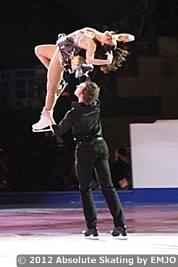Nathalie Pechalat and Fabian Bourzat: "Ice dancing is not only a question of elements"
February 15, 2012
By Titanilla Bőd
Photo © Eva
Maria Jangbro (EMJO), Mireille
Geurts
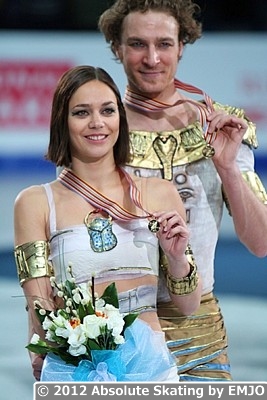 They
are creative and unique and they love all of their projects. They build
each program as a mini-show and the audience is grateful for their approach.
Nathalie Pechalat and Fabian Bourzat are now two-time European champions
and we talked to them after their triumph in Sheffield.
They
are creative and unique and they love all of their projects. They build
each program as a mini-show and the audience is grateful for their approach.
Nathalie Pechalat and Fabian Bourzat are now two-time European champions
and we talked to them after their triumph in Sheffield.
It is said that it is harder to defend a title than to earn it for the first time. Do you agree with this?
Fabian: We have more emotions from this victory than from the first one.
Last year everybody knew that we were above the other couples and that it
would be kind of easy to get the title. But this time we knew we could do
it with the skills we have, but the result after the short dance made us
think that we really need to fight hard. It was more interesting, more emotional
victory for sure.
After the short dance you said that you wanted to ask the judges why you got lower levels. Did you find out what happened?
Fabian: Actually in the end we didn't ask them, because when we saw all
the levels they gave everybody, we realized it was a really strict technical
panel. We just had to get better and make happy even the strictest member
of the panel.
After
the short dance Nathalie posted on Facebook: "I love ice dancing". What
did you mean by that?
Nathalie: It was a joke. We had a dinner with some other skaters and we
were talking about the amazing results for everybody in ice dancing. So
I had this idea: let's joke, let's everybody write "I love ice dancing"
on Facebook, just to remember that sometimes judgment is not very fair,
but we still love what we do. We just wanted to remind everybody that we
love our job, whatever happens.
How did you spend the free day between the short dance and the free dance? Were you nervous about the result?
Nathalie: We just tried not to think about it, just to concentrate on the free dance and do a great job. We saw our families, we talked about things other than ice skating and we just relaxed.
Fabian: And we had a practice too.
Fabian was quoted after the free skating that Nathalie had some doubts and wasn't so sure that you could win again.
Nathalie: I just didn't want to think it's done and we will win. Last year it was easier to get prepared and get the gold medal. This time I said to myself: don't be focused on the result, but on the performance.
Your
programs are always very creative with many interesting elements. Where
do you get the inspiration from?
Nathalie: Here (points at her head) and here (points at Fabian's head). We talk a lot about what we'd like to do; we have many ideas and then we talk to coaches and the choreographer about what is the best one. We try to do a whole mini-show with costume, music and everything.
Do you have any all-time favourite programs of yours?
Fabian: I love Cats. It's my favourite program so far - and Circus probably.
Nathalie: I love Chaplin as well, and this one from this year. It's hard to choose just one. Every year we like our programs very much because it comes from our heart. We love all our projects.
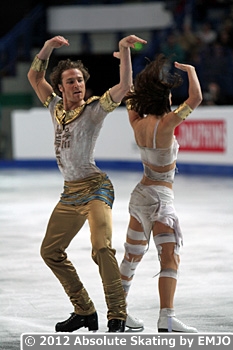
Who is the most creative?
Nathalie: Fabian has lot of ideas but then usually I put them together.
How long does it take to create a new program? Is it hard to decide what theme to skate to?
Fabian: When we have to build the program it's not so hard because we like
to think about it long before. We've already started to think about next
year. When we have to do the program itself we 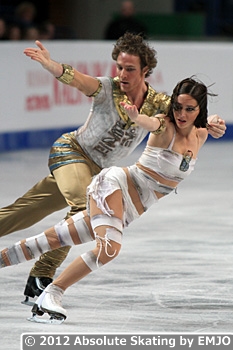 just
try to put it together. It takes 10 to 15 days. Then we have to decide what
kind of elements we can put at each part of the music. It usually takes
one month to build a program from the beginning to the end.
just
try to put it together. It takes 10 to 15 days. Then we have to decide what
kind of elements we can put at each part of the music. It usually takes
one month to build a program from the beginning to the end.
Can we know what you plan for next year?
Fabian: No!
Nathalie: We can say it will be something different. We don't like easy
things and we say: okay, now we did something black, now let's do something
yellow, something blue and so on. We try to change our style every year,
to show the people we are not here just because we can do counters, brackets
or twizzles, but because we are able to dance any kind of dance and we can
express ourselves to any kind of music.
As for the compulsory dance part of the short dance, do you have any favourites? Which ones do you prefer?
Fabian: Latino is fine this year. We will see how polka works next year.
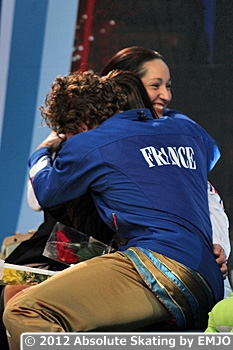 Nathalie:
The compulsory dance of polka is quite funny to skate because it is a happy
dance. The terrible thing is that the music and the atmosphere of the polka
is very old school and I don't think it will push the ice dancing to be
modern. Polka is not like tango or blues that you can have modern program
to it.
Nathalie:
The compulsory dance of polka is quite funny to skate because it is a happy
dance. The terrible thing is that the music and the atmosphere of the polka
is very old school and I don't think it will push the ice dancing to be
modern. Polka is not like tango or blues that you can have modern program
to it.
For the spectators it is hard to see the technical differences between the couples.
Nathalie: For us skaters, too. Sometimes we don't really understand what
they want, what to reach, what to do to get the level four. It is quite
hard to choose the best skater. We have to do some elements but for me ice
dancing is not only a question of elements, it's a question of skating skills.
It is also about what you can express, how you feel the music, how you can
do something exactly to the music. It is not only that we do a twizzle with
our hands in this or that position. This is the evolution of ice dancing;
these are the rules but I understand that the audience doesn't really know
which couple is the best.
In ice dancing the judges closely watch the practices. There were some opinions that maybe you were second in the short dance because you weren't so confident at the practice and this might have influenced the judges.
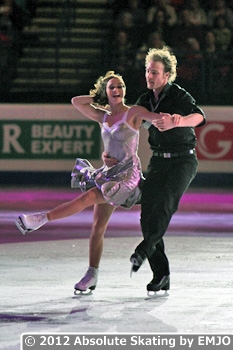 Fabian:
Probably, it might have happened. Who knows? The last two practices before
the short dance we both fell on the circular step sequence; we did not do
good twizzles. But we are here to do the job in the right moment and the
judges are supposed to give the mark at the right moment.
Fabian:
Probably, it might have happened. Who knows? The last two practices before
the short dance we both fell on the circular step sequence; we did not do
good twizzles. But we are here to do the job in the right moment and the
judges are supposed to give the mark at the right moment.
If you could change the rules of ice dancing, what would you change?
Fabian: We'd try to involve people from theatre, ballroom dancing and so on, as they do in the shows like X factor, and get a balance with the technical part and the new, arts' aspect. This mix would be fairer for everyone; we'd get not just the old style of judging the technique but also a different point of view.
Nathalie: Maybe one judge could judge the musicality, another one the interpretation,
and so on.
(Fabian had to leave at this point.)
You have tried training in France, training in Moscow and now you train in the US. What are the main differences in the training methods?
Nathalie: What we learnt in Russia is quite similar to what we learn now
in the US, because it was part of our move. We wanted to stay on the same
path, to have a continuity, not to break everything or change how we skate.
That's why we moved from Zhulin to Anjelika Krylova. In Detroit there are
many more skaters on the ice than in Moscow and I think we spend more time
on the ice, too. But the technical and artistic part is quite the same.
What about the daily life?
Nathalie: This is like black and white. In Moscow it wasn't an easy or comfortable life, but I have a very good friend there, not a skater, and I loved to spend my weekends in Moscow going to a museum, a restaurant, enjoy the life there. In America it is completely the opposite. When the practice is over, I get bored, but there is a very good team of skaters, so we do some stuff all together. Detroit is not the best city in America, but it is so comfortable. This is my point. Everything is easy in the US. Everybody is so happy, trying to help, they are smiling - it wasn't like this in Russia.
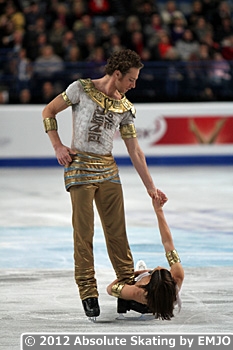
Is there anything from France that you miss?
Nathalie: Of course, food! Every time I go back to France, I'm happy that
I can see my family and friends, that I can eat what I love to eat, but
after a few days I get the feeling that I want to go home. I can't stay
in France for too long, because my home is not there any more. I have no
bedroom; I have to stay with my friends or family, it is not my life any
more. My life is in Detroit.
You are very active on Facebook. How important is it to you to get connected with your fans also through social media?
Nathalie: We try to keep them up-to-date, as often as we can. It is important for the fans. They love ice skating, so they love ice skaters and they like to know what's happening, what is new, what are we doing, what we watch on TV. I think this is part of our job and it's quite funny actually.
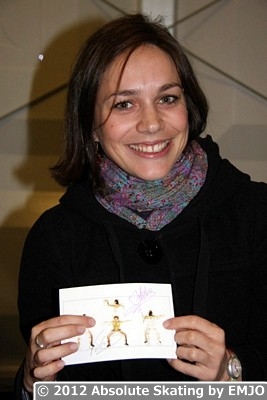
The World championships will be in Nice, France.
Does it mean an extra pressure for you?
Nathalie: We are home competitors but the French federation will do everything
for us so we are in the best environment, but not being disturbed, without
too much pressure. The audience will be on our side, so we have to be prepared
for that. It is an excitement but we can't be too excited. Mainly we have
to be one hundred per cent sure about what we have to do on the ice. Then
we will enjoy being in our home country. And after our competition it will
be a great fun.
What do you think you'll need to beat Tessa and Scott and Meryl and Charlie?
Nathalie: The French expect us to win the competition. We will try not to disappoint them. I know it's hard; it is a high level competition, with very good skaters, but that's what we want, so let's do it! We don't have anything to lose. Last year we made a mistake and lost a medal, so this year we will do everything we can to be on the podium.
